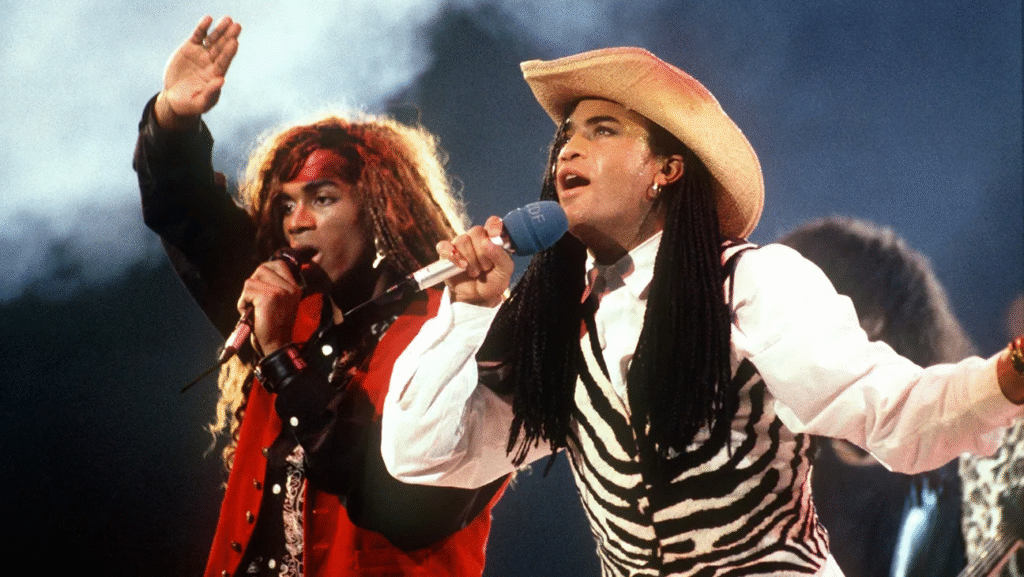The story of Milli Vanilli, the German pop duo that soared to global fame in the late 1980s only to crash spectacularly, is one of the most infamous tales in music history. Their rise was meteoric, driven by catchy hits, slick dance moves, and a carefully crafted image. Their fall, however, was a dramatic unraveling sparked by a lip-syncing scandal that exposed the duo as a manufactured act, leading to public backlash, legal battles, and a tragic aftermath.

The Rise of Milli VanilliFormation and Background
Milli Vanilli was formed in 1988 by German producer Frank Farian, a music industry veteran known for creating successful acts like Boney M. Farian assembled the duo around Rob Pilatus (born June 8, 1965) and Fabrice “Fab” Morvan (born May 14, 1966), two charismatic dancers and models living in Munich. Both had tough upbringings—Pilatus, born in New York and adopted by a German family, faced racial prejudice in Germany, while Morvan, born in Paris to Guadeloupean parents, had a challenging childhood marked by poverty and abuse. They met in Munich’s nightlife scene, bonding over their shared struggles and dreams of stardom.Farian, spotting their marketable looks and dance skills, paired them to front his new pop project. However, he deemed their singing voices inadequate for the polished sound he envisioned. Instead, Farian used studio vocalists—Charles Shaw, Johnny Davis, and others—to record the tracks, while Pilatus and Morvan provided the visual appeal. This decision laid the groundwork for the duo’s eventual downfall.

Breakthrough Success
Milli Vanilli debuted with their album Girl You Know It’s True (1988 in Europe, 1989 in the U.S.), which blended catchy pop, R&B, and dance beats. The album’s title track, a cover of a Numarx song, became a global smash, hitting No. 2 on the Billboard Hot 100. Other hits like “Blame It on the Rain,” “Girl I’m Gonna Miss You,” and “Baby Don’t Forget My Number” followed, all featuring infectious hooks and the duo’s signature synchronized dance routines. Their exotic image—dreadlocks, flashy outfits, and European flair—captivated audiences, particularly in the U.S., where they filled a gap for polished pop during the rise of hip-hop and hair metal.By 1990, Milli Vanilli was a global phenomenon. Their album sold over 6 million copies in the U.S. alone, earning triple-platinum status. They won three American Music Awards, a Grammy for Best New Artist (1990), and embarked on a world tour. Their music videos dominated MTV, and their story of overcoming hardship resonated with fans. To the public, Rob and Fab were the voices behind the hits, and their charm and stage presence made them superstars.

Cracks in the Facade
Early Warning Signs
Despite their success, signs of trouble emerged early. During live performances, Pilatus and Morvan lip-synced to pre-recorded vocals, a common practice in pop but one that Farian took to an extreme by not using their voices at all. In July 1989, during a live MTV performance in Bristol, Connecticut, the backing track for “Girl You Know It’s True” malfunctioned, looping the phrase “Girl, you know it’s…” repeatedly. Pilatus, visibly panicked, fled the stage, exposing the act’s reliance on playback. Though the incident was downplayed, it raised suspicions among industry insiders.Behind the scenes, Pilatus and Morvan grew uneasy with their role as “puppets.” They wanted to sing their own material and pressed Farian to let them record. Farian, however, refused, knowing their voices couldn’t match the studio recordings. Tensions mounted as the duo’s fame grew, with Rob and Fab trapped in a lie they couldn’t escape without risking their careers.
The Scandal Breaks
The truth unraveled in November 1990. Charles Shaw, one of the real vocalists, frustrated by lack of credit and payment, told the press he sang on the tracks. Though Farian initially silenced Shaw with a reported $150,000 payoff, the story gained traction. Under pressure, Farian held a press conference on November 14, 1990, admitting that Pilatus and Morvan did not sing on the Girl You Know It’s True album. He revealed the real vocalists’ names and confirmed that Milli Vanilli was essentially a studio creation.The backlash was swift and brutal. Fans felt betrayed, and the media painted Pilatus and Morvan as frauds, though Farian, the mastermind, faced less scrutiny. On November 19, 1990, the National Academy of Recording Arts and Sciences revoked Milli Vanilli’s Grammy for Best New Artist—the first time a Grammy was rescinded. Arista Records dropped the duo and pulled their album from shelves, a move that cost millions. Lawsuits followed, with fans filing class-action suits for fraud, some settled with refunds for album purchases.

The Fall and Aftermath
Public and Personal Struggles
The scandal destroyed Milli Vanilli’s career overnight. Pilatus and Morvan were vilified, with the media focusing on their role as the face of the deception rather than Farian’s orchestration. The duo attempted a comeback as Rob & Fab, releasing a self-titled album in 1993 with their real voices. However, the album flopped, selling only 2,000 copies, as the public’s trust was irreparably broken.The fallout took a heavy toll. Rob Pilatus, already struggling with the pressures of fame, spiraled into drug addiction and depression. He faced legal troubles, including arrests for vandalism and assault, and attempted suicide multiple times. Fab Morvan, while also devastated, showed more resilience, focusing on rebuilding his life through music and personal growth.
Tragic End and Legacy
In 1998, Farian attempted to revive Milli Vanilli with a new album, Back and in Attack, featuring Pilatus and Morvan’s real voices. On April 2, 1998, just before a promotional tour, Pilatus was found dead in a Frankfurt hotel room at age 32. His death was ruled an accidental overdose of alcohol and prescription drugs. The loss was a devastating coda to the duo’s story, leaving Morvan to carry on alone.Fab Morvan has since rebuilt his career, performing as a solo artist, DJ, and motivational speaker. He has been open about the scandal, emphasizing the duo’s lack of control and their genuine desire to sing. In recent years, the Milli Vanilli story has been reexamined through documentaries like Milli Vanilli (2023) on Paramount+ and an upcoming biopic, offering a more sympathetic view of Pilatus and Morvan as young, ambitious artists manipulated by a cynical industry.
Why It’s Shocking
The Milli Vanilli saga shocked the music world for several reasons:
- Scale of Deception: The revelation that a Grammy-winning act didn’t sing a note on their multi-platinum album was unprecedented, exposing the music industry’s potential for manipulation.
- Cultural Impact: Their fall challenged the authenticity valued in music, sparking debates about lip-syncing and manufactured pop acts, a topic still relevant with modern artists.
- Human Cost: The personal toll on Pilatus and Morvan, particularly Pilatus’s tragic death, underscored the devastating effects of fame and public shaming.
- Industry Hypocrisy: While Pilatus and Morvan were scapegoated, Farian and the industry faced less accountability, highlighting power imbalances in music production.
Broader Context and Legacy
Milli Vanilli’s story reflects broader issues in the music industry, including the pressure to create marketable acts and the use of studio wizardry to enhance or replace talent. Lip-syncing was not unique to them—acts like New Kids on the Block and Madonna used backing tracks—but Milli Vanilli’s complete reliance on ghost singers crossed a line for audiences. The scandal also had racial undertones, as Pilatus and Morvan, both Black, were disproportionately blamed compared to Farian, a white producer.Today, Milli Vanilli’s music endures as nostalgic pop, with “Girl You Know It’s True” still a dancefloor staple. Their story serves as a cautionary tale about authenticity, the cost of fame, and the human beings behind the celebrity facade. Posts on X reflect ongoing fascination, with users debating whether the duo deserved their vilification or were victims of a ruthless industry. The consensus leans toward sympathy, recognizing Pilatus and Morvan as talented performers caught in a lie they didn’t create.In summary, Milli Vanilli’s rise and fall is a gripping saga of fame, deception, and redemption. From chart-topping glory to public disgrace, their story remains a poignant reminder of the music industry’s complexities and the personal toll of its excesses.


